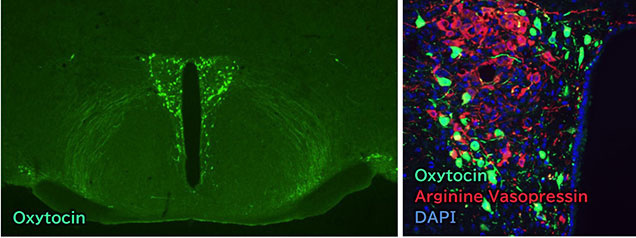Anti Oxytocin Antibodies
Oxytocin, a peptide hormone composed of nine amino acids, is primarily produced in the hypothalamus (paraventricular and supraoptic nuclei) and released into the bloodstream from the posterior pituitary. Often called the "happiness hormone" or "love hormone," oxytocin influences a wide range of functions. It plays key roles in inducing labor and breast milk secretion, fostering nurturing behaviors and social interactions, reducing stress and anxiety, and regulating metabolism. Furthermore, oxytocin's association with psychiatric disorders prompted research investigating its potential as a therapeutic agent for autism spectrum disorders. Fujifilm Wako offers guinea pig anti-oxytocin antibodies, which are valuable for multiplex immunohistochemistry.
What is Oxytocin?
Oxytocin is a peptide hormone composed of nine amino acids, mainly produced in the hypothalamus (paraventricular and supraoptic nuclei) and released into the bloodstream from the posterior pituitary1). Oxytocin has long been known to induce labor and breast milk secretion. During childbirth, oxytocin released from the posterior pituitary causes the uterus to contract, facilitating delivery. After childbirth, oxytocin is released from the posterior pituitary in response to the baby’s suckling stimulus. This causes the muscle fibers of the mammary glands to contract leading to the secretion of breast milk.
In addition to its hormonal role, oxytocin also acts as a neurotransmitter. It has various effects, such as promoting nurturing and social behaviors, reducing stress and anxiety, and controlling metabolism. Oxytocin’s association with psychiatric disorders (such as autism spectrum disorder, depression, and schizophrenia) has been the subject of many studies. Notably, the plasma levels of oxytocin were found to be lower in children with autism spectrum disorder compared to healthy individuals2), and repetitive behaviors, one of the core symptoms of autism spectrum disorder, were reduced following oxytocin administration3-4). Thus, oxytocin is expected to be effective in treating autism spectrum disorders.
Anti Oxytocin, Guinea Pig
"Anti Oxytocin, Guinea Pig" is a guinea pig polyclonal antibody that reacts with Oxytocin5). It can be used to perform multiplex immunohistochemistry.
Antibody Information
| Clonality | Polyclonal |
|---|---|
| Antigen | KLH conjugated synthetic peptide (CYIQNCPLG-NH2) |
| Host | Guinea pig |
| Formulation | Antiserum diluted in PBS |
| Conjugate | Unconjugated |
| Cross-reactivity | Human, Mouse, Rat, Bovine |
| Application | Immunohistochemistry (Frozen Section) 1:1,500 |
Application Data
Immunohistochemistry

Species: Mouse
Site: Paraventricular hypothalamic nucleus
Sample: Frozen section
Antibody concentration: 1:1,500
Data by courtesy of
Dr. Miyata, Department of Applied Biology, Kyoto Institute of Technology
References
- Murphy, D. et al.: J. Neuroendocrinol., 24(4), 539(2012).
The Hypothalamic-Neurohypophyseal System: From Genome to Physiology - Modahl, C. et al.: Biol. Psychiatry, 43(4), 270(1998).
Plasma oxytocin levels in autistic children - Hollander, E. et al.: Neuropsychopharmacology, 28(1), 193(2003).
Oxytocin infusion reduces repetitive behaviors in adults with autistic and Asperger's disorders - Yamasue, H. et al.: Mol. Psychiatry, 25(8), 1849(2020).
Effect of intranasal oxytocin on the core social symptoms of autism spectrum disorder: a randomized clinical trial - Miyata, S.: Front. Endocrinol., 8, 275(2017).
Advances in understanding of structural reorganization in the hypothalamic neurosecretory system
Product List
- Open All
- Close All
Anti Oxytocin, Guinea Pig (Polyclonal Antibody)
For research use or further manufacturing use only. Not for use in diagnostic procedures.
Product content may differ from the actual image due to minor specification changes etc.
If the revision of product standards and packaging standards has been made, there is a case where the actual product specifications and images are different.



